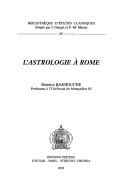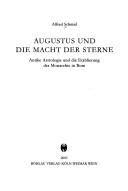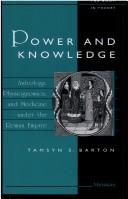| Listing 1 - 7 of 7 |
Sort by
|

ISBN: 9042911271 2877236323 9789042911277 Year: 2002 Volume: 29 Publisher: Louvain: Peeters,
Abstract | Keywords | Export | Availability | Bookmark
 Loading...
Loading...Choose an application
- Reference Manager
- EndNote
- RefWorks (Direct export to RefWorks)
Astrology, Roman --- Astrology, Roman. --- Astrologie romaine --- 133.5 --- Roman astrology --- Occulte wetenschappen--in engere zin --- 133.5 Occulte wetenschappen--in engere zin
Book
ISBN: 8877419326 9788877419323 Year: 1996 Volume: 16 Publisher: Pisa : ETS,
Abstract | Keywords | Export | Availability | Bookmark
 Loading...
Loading...Choose an application
- Reference Manager
- EndNote
- RefWorks (Direct export to RefWorks)
Astronomy --- Astronomy, Ancient. --- Astrology, Roman. --- Astronomie ancienne --- Astrologie romaine --- History. --- 133.50937 --- Philosophy & psychology Astrology History Ancient World Roman Empire --- Astrology, Roman --- Astronomy, Ancient --- Physical sciences --- Space sciences --- Ancient astronomy --- Roman astrology --- History
Book
ISBN: 9782875623188 2875623184 Year: 2022 Publisher: Liège Presses universitaires de Liège
Abstract | Keywords | Export | Availability | Bookmark
 Loading...
Loading...Choose an application
- Reference Manager
- EndNote
- RefWorks (Direct export to RefWorks)
Issu du colloque réuni à l'Université de Liège les 20-21 juin 2018, 150 ans après que Franz Cumont eut reçu de quelque divinité orientale son heureux thème de géniture, cet ouvrage se donne deux objectifs : souligner l'importance de l'historien belge dans le développement d'une approche historique de l'astrologie ; apporter des éclairages sur quelques paradoxes et ambiguïtés dans les relations entre astrologie, astrologues et pouvoir impérial. La première partie contribue à expliquer pourquoi une science aussi suspecte que l'astrologie intéressa autant l'historien des religions qu'était Franz Cumont, en situant ses recherches astrologiques dans l'économie générale de son œuvre et dans l'évolution de sa pensée, puis en mettant en lumière, à travers sa correspondance, son importante entreprise du Catalogus Codicum Astrologorum Graecorum. La deuxième partie évalue le poids paradoxal des signes astrologiques et des astrologues à la cour des empereurs romains : pour quelles raisons les historiens romains exploitèrent-ils si peu les potentialités esthétiques, dramatiques et symboliques des prédictions astrales ? pourquoi le recours aux horoscopes et aux autres signes astrologiques était-il toujours à double tranchant, aussi bien pour les empereurs et les 'destinés au pouvoir' que pour les opposants ? était-ce réellement à sa qualité d'expert que Thrasylle, ± l'astrologue de Tibère ? selon Franz Cumont, devait son influence à la cour impériale ? La troisième partie interroge les contextes dans lesquels des astrologues furent expulsés et les pratiques astrologiques condamnées par le pouvoir impérial : dans quelles circonstances les auteurs anciens évoquent-ils ces condamnations ? les bannissements collectifs des astrologues s'articulent-ils à un schéma répressif récurrent à partir de la mise en place du régime impérial ? Autant de raisons de s'attarder, après Franz Cumont, sur quelques ± sottises astrologiques ? des empereurs romains, dont l'attachement à l'astrologie est une réalité historique fascinante.
Cumont, Franz --- Astrologie antique --- Astrologie --- Astrology and politics. --- Astrology, Roman. --- Cumont, Franz Valery Marie, --- Cumont, Franz, --- Astrology, Roman --- Astrology and politics --- Politics, Practical --- Roman astrology --- Cumont, Franz Valery Marie --- Cumont, F. --- Cumont, Franciscus, --- Kiwmon, Pʻrantsʻ, --- Geschiedenis
Book
ISBN: 0674437055 0674437063 Year: 1994 Publisher: Harvard University Press
Abstract | Keywords | Export | Availability | Bookmark
 Loading...
Loading...Choose an application
- Reference Manager
- EndNote
- RefWorks (Direct export to RefWorks)
To the practical modern mind, the idea of divine prophecy is more ludicrous than sublime. Yet to our cultural forebears in ancient Greece and Rome, prophecy was anything but marginal; it was in fact the basic medium for recalling significant past events and expressing hopes for the future, and it offered assurance that divinities truly cared about mere mortals. Prophecy also served political ends, and it was often invoked to support or condemn an emperor's actions. In Prophets and Emperors, David Potter shows us how prophecy worked, how it could empower, and how the diverse inhabitants of the Roman Empire used it to make sense of their world. This is a fascinating account of prophecy as a social, religious, and political phenomenon. The various systems of prophecy--including sacred books, oracles, astrological readings, interpretation of dreams, the sayings of holy men and women--come into sharp relief. Potter explores the use of prophecy as a nieans of historical analysis and political communication, and he describes it in the context of the ancient city. Finally, he traces the reformation of the prophetic tradition under the influence of Christianity in the fourth century. Drawing on diverse evidence--from inscriptions and ancient prophetic books to Greek and Roman historians and the Bible--Potter has produced a study that will engage anyone interested in the religions of the ancient Mediterranean and in the history and politics of the Roman Empire.
Astrology, Roman. --- Divination. --- Oracles, Roman. --- Parapsychologie, Okkultismus. --- Profetieën. --- Prophets. --- Religion. --- Romeinse keizertijd. --- Sibylles. --- Sibyls. --- Voorspellingen. --- HISTORY / General. --- Prophets -- Rome. --- RELIGION / Ancient*. --- Rome -- Religion. --- HISTORY / Ancient / General. --- Women prophets --- Religion, Primitive --- Atheism --- Irreligion --- Religions --- Theology --- Minor prophets --- Prophethood --- Seers --- Persons --- Roman oracles --- Augury --- Soothsaying --- Occultism --- Worship --- Roman astrology
Book
ISBN: 0674715659 9780674715653 Year: 1994 Volume: 7 Publisher: Cambridge (Mass.): Harvard university press,
Abstract | Keywords | Export | Availability | Bookmark
 Loading...
Loading...Choose an application
- Reference Manager
- EndNote
- RefWorks (Direct export to RefWorks)
Astrologie [Romeinse ] --- Astrologie romaine --- Astrology [Roman ] --- Oracles [Roman ] --- Oracles romains --- Orakels [Romeinse ] --- Profeten --- Prophets --- Prophètes --- Roman oracles --- Romeinse orakels --- Sibillen --- Sibyllen --- Sibylles --- Sibyls --- Divination --- Oracles, Roman. --- Sibyls. --- Astrology, Roman. --- Rome --- Religion. --- Religion --- Oracles, Roman --- Astrology, Roman --- -Oracles, Roman --- -Astrology, Roman --- #GROL:SEMI-292 --- 133.3 --- Roman astrology --- Minor prophets --- Prophethood --- Seers --- Persons --- Women prophets --- Augury --- Soothsaying --- Occultism --- Worship --- Philosophy & psychology Divinatory arts --- Prophètes --- Divination - Rome. --- Prophets - Rome. --- Divination - Rome --- Prophets - Rome --- Rome - Religion

ISBN: 3412102059 9783412102050 Year: 2005 Publisher: Koln: Böhlau,
Abstract | Keywords | Export | Availability | Bookmark
 Loading...
Loading...Choose an application
- Reference Manager
- EndNote
- RefWorks (Direct export to RefWorks)
Astrology, Roman --- Astrology and politics --- History --- Augustus, --- Rome --- Kings and rulers --- Astrology, Roman. --- Kings and rulers. --- Roman astrology --- Politics, Practical --- Octavius Caesar, --- Gaius Octavius, --- Octavius, Gaius, --- Octavianus, --- Octavianus, Gaius Julius Caesar, --- Gaius Julius Caesar Octavianus, --- Octavian, --- Caius Julius Caesar Octavianus, --- T︠S︡ezarʹ Oktavian Avgust, --- Oktavian-Avgust, T︠S︡ezarʹ, --- Avgust, T︠S︡ezarʹ Oktavian, --- Octavianus Augustus, --- Augusto, --- Cesarz August, --- Ogusṭus, --- Augustus Caesar, --- Gaius Octavius Thurinus, --- Octavio Augusto, --- Cayo Octavio Turino, --- Thurinus, Gaius Octavius, --- Turino, Cayo Octavio, --- אוגוסטוס --- Astrology and politics - History - To 1500 --- Augustus, - Emperor of Rome, - 63 B.C.-14 A.D --- Rome - Kings and rulers

ISBN: 047210425X 0472088521 9780472088522 Year: 2002 Publisher: Ann Arbor : University of Michigan Press,
Abstract | Keywords | Export | Availability | Bookmark
 Loading...
Loading...Choose an application
- Reference Manager
- EndNote
- RefWorks (Direct export to RefWorks)
Astrology, Roman --- -Medicine, Greek and Roman --- -Occultism and science --- -Physiognomy --- -Science --- -133.5861 --- 133.50937 --- Natural science --- Science of science --- Sciences --- Face reading --- Metoposcopy --- Science and occultism --- Greek medicine --- Medicine, Roman --- Medicine, Unani --- Roman medicine --- Tibb (Medicine) --- Unani medicine --- Unani-Tibb (Medicine) --- Roman astrology --- History --- Philosophy & psychology Astrology Medical --- Philosophy & psychology Astrology History Ancient World Roman Empire --- Physiognomy --- Physiognomy. --- Occultisme et sciences --- Astrologie romaine --- Physiognomonie --- Medicine, Greek and Roman --- Occultism and science --- Science --- 133.5861 --- Characters and characteristics --- Psychology --- Face --- Pathognomy --- Phrenology --- Astrology --- Medicine --- Occultism --- History of Medicine --- Médecine grecque et romaine --- History. --- history --- Histoire. --- Natural sciences --- History of Medicine. --- history. --- Médecine grecque et romaine
| Listing 1 - 7 of 7 |
Sort by
|

 Search
Search Feedback
Feedback About UniCat
About UniCat  Help
Help News
News